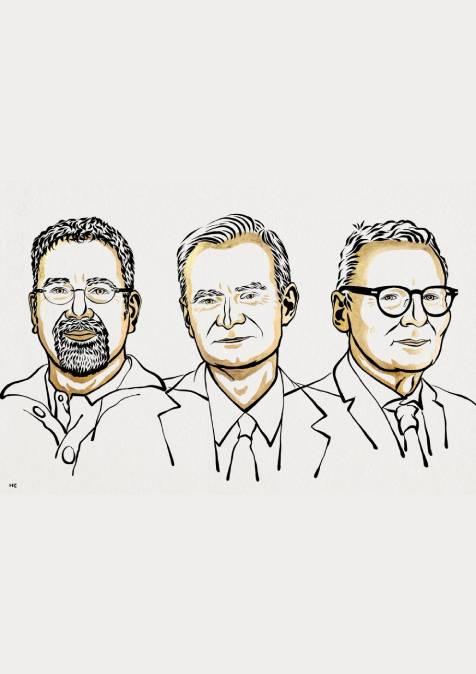Publications /
Opinion
Depuis que l’économie a été reconnue par les Nobel, en 1969, c’est à elle que revient de clore la semaine des cérémonies consacrées à la remise des prix. C’est ainsi que le 14 octobre 2024 trois hommes ont été nominés par l’Académie suédoise : un économiste turco-américain, Daron Acemoglu (MIT), un économiste britannique Simon Johnson (MIT) et un économiste américain James A.Robinson de l’Université de Chicago. Trois lauréats qui travaillent dans des universités américaines reconnues, distingués « pour leurs études sur la façon dont les institutions sont formées et affectent la prospérité ». Acemoglu est le troisième Turc lauréat Nobel, après le biologiste Aziz Sancar en 2015 (Chimie), et Orhan Pamuk, littérature, en 2006. Il est donc aussi le premier économiste diplômé du lycée de Galatasaray, en 1986, à être nominé par les Nobel. Tous trois ont également en commun d’avoir étudié au Royaume-Uni avant de rejoindre les universités américaines.
Daron Acemoglu, sans doute le plus connu des trois, est un auteur prolifique puisqu’il a à son actif quelque 200 articles et plusieurs best Sellers, dont certains co-écrits avec James Robinson et Simon Johnson. Avec James A Robinson, il publie deux ouvrages : ‘’Why Nations fail :The Origins of Power ,Property, and Poverty ‘’(New York, Crown Business 2012), et ‘’The Narrow Corridor : States, Societies, and the fate of Liberty ‘’ (Penguin Press 2019) traduits en français. Et avec Simon Johnson, qui fut également de mars 2007 à août 2008 économiste en chef du Fonds monétaire international (FMI) il publie ‘’ Power and Progress ‘’ (Penguin Random House, en 2023 qui sera publié en français au mois de novembre 2024, par Pearson). C’est une équipe qui est ainsi nobélisée, avec un leader incontesté, dont le nom avait déjà été cité en 2023 comme lauréat potentiel.
Lors de la cérémonie, le président du Comité du Prix en Sciences économiques, Jakob Svensson, a tenu à rappeler que la réduction des « énormes différences de revenus entre les pays est l’un des plus grands défis de notre époque ». Les travaux des lauréats 2024 portent sur les inégalités entre pays, cherchant à mettre en évidence les raisons pour lesquelles certaines de ces inégalités sont persistantes, par exemple celles observées dans le niveau de revenu par habitant et par pays. Et pour cela, ils placent au centre de cette problématique les institutions qui, dans de nombreux cas, ont été développées par de nombreux États à partir de leur histoire coloniale.
Parmi les nombreux apports salués par le Jury, nous en avons privilégié deux :
- Le premier est celui qui met en évidence l’influence des institutions sur la prospérité économique ; rappelant que la répartition actuelle des revenus entre pays est la conséquence d’institutions introduites à l’époque de la colonisation. Beaucoup d’anciennes colonies étant moins développées, moins riches que les pays européens qui les avaient colonisées. Cela va permettre aux colonisateurs d’exporter des institutions souvent européennes, favorables à la croissance qui, en se pérennisant, vont finir par enrichir les pays colonisés.
- Le second est d’expliquer pourquoi et comment les institutions évoluent. Et ce, en s’interrogeant sur les raisons qui poussent les dirigeants autocratiques à étendre le suffrage universel, transformant une autocratie en démocratie. Et ce parce qu’ils ont peur d’une révolution. En plaçant l’inégalité au cœur du changement institutionnel, les régimes autocratiques qui souhaitent rester au pouvoir, tout en évitant une révolution, n’ont pas véritablement le choix. C’est pourquoi ils finissent toujours par transférer, totalement ou partiellement, ce pouvoir au peuple. Ce qui permet à ce dernier, d’espérer et de croire à la mise en place des politiques répondant à ses attentes.
Une nomination qui fait débat, à tort. Dès le lendemain de la remise du Prix Nobel aux trois économistes, soit le15 octobre, Rakesh Bhandari, de l’Université de Berkeley, dénonce une décision très politique, allant jusqu’à parler de « manifeste du parti bourgeois ». C’est faire peu de cas d’un travail salué par un Jury qui a toujours montré une grande indépendance par rapport au politique. Jury qui rappelle dans ses attendus que « les lauréats ont été les pionniers de nouvelles approches, à la fois empiriques et théoriques, qui ont fait progresser de manière significative la compréhension des inégalités mondiales ». Ces recherches ne ferment pas la porte à d’autres contributions. Pionniers d’une nouvelle approche qui ne demande qu’à être enrichie. Entre le Jury et les détracteurs de sa décision, qui fait de la politique ? Celui qui n’hésite pas à placer le débat au plan politique, ou celui qui n’en parle pas ?
Avec ces travaux, qui font suite à ceux de Claudia Goldin, lauréate en 2023, pour sa contribution aux inégalités des femmes sur le marché du travail, le Comité Nobel rappelle aussi que l’économie ce n’est pas seulement l’allocation efficace des ressources, mais aussi les conséquences de cette optimisation pour une meilleure équité dans leur redistribution.












